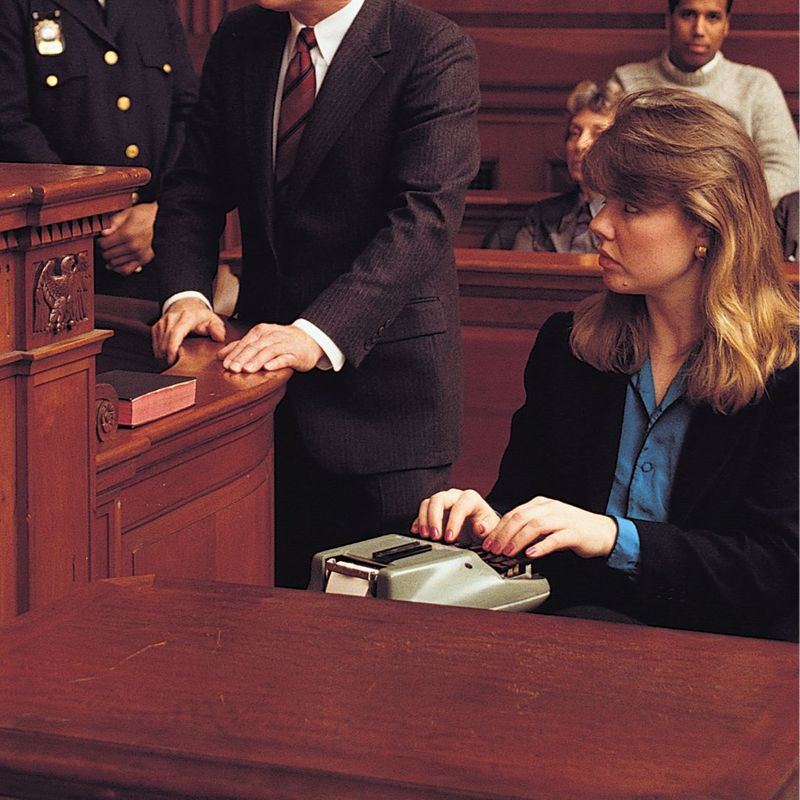Durham court reporting vs. digital recording: which is better?
All Regarding Court Reporting: Crucial Insights Into Its Relevance in Law
Court reporting serves a vital feature within the lawful framework, giving a reliable and exact record of procedures. Via sophisticated methods and devices, court press reporters catch the nuances of testaments and lawful discussion. The significance of their job extends past simple transcription. As the legal landscape progresses, so too does the duty of technology in court reporting. Comprehending these characteristics exposes deeper ramifications for justice and transparency in the legal system.
The Role of Court Reporters in the Legal System

Although typically forgotten, stenotype reporter play a necessary duty in the lawful system by making sure a exact and verbatim document of proceedings. Their key duty entails transcribing spoken words during tests, depositions, and various other legal events, which acts as an official document for future reference. This paperwork is necessary for allures, as it offers the needed details for evaluating decisions made by courts and courts.
Stenotype reporter should possess extraordinary paying attention abilities and a deep understanding of legal terms to record the nuances of testament and argumentation precisely. Their job adds to openness within the judicial process, enabling liability and fairness. Furthermore, they promote accessibility to justice by making records offered to entailed parties, ensuring that everyone has the possibility to assess the process. In this means, court reporters support the honesty of the legal system, strengthening the value of exact communication in matters of law.
Tools and methods Made use of in Court Reporting
In court reporting, different techniques and devices improve the accuracy and performance of transcription. Stenography modern technology plays a significant function, enabling reporters to capture talked words swiftly, while electronic recording approaches use alternate services for paperwork. Recognizing these tools is essential for grasping how stenotype reporter fulfill their crucial feature in the legal system.
Stenography Modern Technology Introduction
Stenography technology functions as the foundation of contemporary court reporting, enabling efficient and specific transcription of talked discussion. Using specialized machines known as stenographs, stenotype reporter can catch speech at exceptional speeds, commonly going beyond 200 words per minute. These machines use a special key-board format that enables multiple secrets to be pushed simultaneously, developing phonetic depictions of words - durham court reporting. This approach reduces the requirement for comprehensive punctuation and boosts transcription accuracy. Furthermore, clerks utilize different shorthand techniques and icons to more streamline the procedure, making certain that no information is ignored during process. The combination of stenography technology not only fosters reliable interaction in legal settings but additionally supports the stability of the judicial procedure by giving exact and trusted documents of conversations
Digital Recording Methods
An enhancing number of court reporting professionals are turning to electronic recording techniques to enhance the accuracy and performance of their transcriptions. These methods use advanced sound and video clip technology to record process in real-time. Digital recorders, usually combined with high-quality microphones, ensure that every word spoken is maintained with clearness. In addition, specialized software can record audio documents instantly, permitting quicker turn-around times. Some professionals integrate dual recording systems for redundancy, ensuring no crucial info is shed. On top of that, electronic recordings can be conveniently indexed and browsed, promoting quick access of details sectors. As legal atmospheres progress, embracing these electronic devices not only simplifies the reporting procedure but also maintains the honesty of the record.
The Significance of Accuracy in Transcription
Accuracy in transcription is crucial in court reporting, as it ensures that lawful records mirror truth web content of procedures. This accuracy can considerably influence situation results, affecting the decisions made by courts and judges. Subsequently, keeping high standards of precision is extremely important in the legal occupation.
Accuracy in Legal Records
Although the legal system relies heavily on eloquent disagreements and influential unsupported claims, truth foundation of judicial process hinges on the accuracy of legal records. Exact transcription is important, as it guarantees that every declaration, judgment, and inquiry is recorded correctly. Such precision serves multiple objectives, including giving a reputable recommendation for appeal processes and keeping the stability of the judicial system. Mistakes in transcription can bring about misconceptions, misconceptions, and potentially detrimental repercussions for all celebrations involved. Subsequently, court reporters should possess phenomenal abilities and attention to information, as their job directly affects the clearness of lawful records. Eventually, the precision of lawful documents underpins the depend on put in check my source the judicial procedure, enhancing the value of careful transcription.

Effect on Situation Outcomes
When lawful process unfold, the precision of transcription commonly dictates the trajectory of a case's end result. Accurate court reporting assurances that every word talked is efficiently captured, allowing juries, courts, and attorneys to make informed decisions based on the document. Mistakes in transcription can result in misconceptions, misconceptions, and possibly unfair verdicts. The stability of legal documents relies heavily on the accuracy of these documents, as they work as the structure for charms and more lawsuits. In high-stakes cases, where the effects are profound, the role of a stenotype reporter becomes even extra essential. Consequently, preserving rigorous requirements in transcription not only supports the lawful process however additionally promotes the concepts of justice and justness in the court.
Court Reporting in Different Legal Settings
Court reporting plays a necessary duty throughout numerous lawful setups, guaranteeing that proceedings are accurately documented for future recommendation. In criminal court, stenotype reporter transcribe statements, proof, and judicial rulings, which are essential for charms and instance testimonials. In civil litigation, precise transcripts assist in the discovery procedure and offer a dependable document for trial process. Administrative hearings often depend on court press reporters to preserve an official document, making certain transparency and liability in governmental procedures. Family members courts also take advantage of court reporting, as accurate documents of proceedings can influence custodianship decisions and settlements. Furthermore, depositions in pre-trial phases need find out this here exact recordings to capture the subtleties of witness statements, which might be substantial in forming case techniques. On the whole, court reporting functions as a keystone in the lawful system, promoting justness and quality throughout diverse judicial environments.
The Effect of Innovation on Court Reporting
As innovation proceeds to evolve, its influence on court reporting has come to be progressively substantial. Innovations such as digital recording, real-time transcription software application, and synthetic knowledge have actually transformed conventional practices. Digital audio recorders now capture court room proceedings with exceptional clearness, permitting stenotype reporter to concentrate on subtleties and context rather than exclusively on inputting. Real-time transcription innovations allow immediate accessibility to transcripts, promoting effectiveness and enhancing cooperation amongst legal specialists. Additionally, expert system devices are being incorporated to aid in the transcription procedure, minimizing human mistake and expediting paper generation. Regardless of these innovations, the vital skills of court reporters remain vital, as they give a nuanced understanding of lawful language and courtroom dynamics. Inevitably, technology complements as opposed to replaces the proficiency of stenotype reporter, ensuring that the stability and accuracy of lawful documentation are supported in a significantly digital landscape.
Profession Opportunities and Pathways in Court Reporting
The development of modern technology in court reporting has actually opened a selection of profession chances for aspiring professionals in the field. Generally, court press reporters were largely accountable for recording lawful proceedings. Nevertheless, improvements such as electronic recording and real-time reporting have broadened their duties.
Today, stenotype reporter can specialize in locations such as captioning for transmission, supplying transcription services for lawful companies, and functioning in the corporate market for depositions or meetings - durham court reporting. Additionally, opportunities in remote reporting, particularly as a result of the surge of online courtrooms, have ended up being significantly common
Educational pathways include official training programs, accreditation programs, and proceeding education to remain upgraded with technical adjustments. Networking within professional and legal companies also plays a considerable duty in occupation advancement. On the whole, the diverse chances in court reporting mirror the dynamic nature of the legal occupation and the increasing demand for skilled specialists.
The Future of Court Reporting in an Evolving Legal Landscape
How will the function of court reporting adapt dig this as the legal landscape remains to progress? As innovation developments, court reporting is most likely to accept ingenious devices such as expert system and real-time transcription software program. These innovations may boost precision and efficiency in recording lawful process. The raising prevalence of remote hearings necessitates that court press reporters become skilled in electronic systems, making sure smooth documentation regardless of area.
At the same time, stenotype reporter will certainly need to adapt their skills to take care of new sorts of cases, such as those involving cyber regulation and copyright disagreements, which call for specialized knowledge. Additionally, the demand for immediate access to transcripts will push experts to provide quicker turnaround times without compromising high quality. Inevitably, the future of court reporting will certainly depend upon a balance between standard skills and technical integration, ensuring that the honesty of the lawful procedure continues to be intact in a progressively electronic globe.
Regularly Asked Questions
Just How Do Court Reporters Manage Delicate Details During Process?

What Credentials Are Needed to Become a Court Reporter?
To come to be a court press reporter, people usually require a high institution diploma, specialized training from a recognized program, efficiency in shorthand or voice writing, and accreditation or licensure, relying on state requirements and guidelines.
Are Court Reporters Required to Have a Permit?
Court press reporters are usually needed to obtain a permit, depending upon the territory. Licensing assurances that they satisfy certain criteria of effectiveness and expertise, which is important for keeping the honesty of lawful process.
Exactly How Do Stenotype Reporter Handle Various Accents and Languages?
Stenotype reporter handle various accents and dialects with extensive training, method, and experience with numerous speech patterns. They often utilize specialized software application and techniques to properly capture spoken words, making sure clarity and accuracy in their transcripts.
What Is the Ordinary Salary for a Stenotype Reporter?
The ordinary wage for a court reporter varies by location and experience, generally ranging from $50,000 to $80,000 annually. In high-demand areas, incomes can go beyond $100,000, showing the career's significance and specialized skills.
Usually ignored, court reporters play an important function in the legal system by making certain a precise and verbatim document of procedures. In criminal court, court reporters transcribe testaments, evidence, and judicial judgments, which are essential for allures and situation reviews. Family courts likewise benefit from court reporting, as accurate documentation of procedures can affect custody choices and settlements. Typically, court reporters were mostly accountable for transcribing lawful procedures. Today, court reporters can specialize in areas such as captioning for tv broadcasts, offering transcription services for legal firms, and working in the company industry for depositions or meetings.